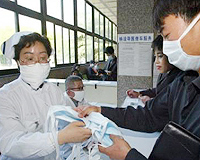
A draft amendment to the country's 15-year-old law on the prevention and control of infectious diseases gives top priority to prevention and early warning mechanisms to prevent epidemics, such as the severe acute respiratory syndrome (SARS), from spreading.
The draft amendment was submitted to the latest session of the Standing Committee of the 10th National People's Congress (NPC) on Friday for preliminary review.
Lawmakers will review a contingency mechanism to handle public health emergencies drafted by the State Council.
The draft underscores preventive efforts in every single link of the process, from reporting and treatment to control of infectious diseases.
Under the draft amendment, the country would establish a monitoring and early warning system to timely discover factors that might have any impact on the occurrence and spread of infectious diseases and forecast epidemic trends.
At the same time, isolated treatment of individual patients who develop symptoms at an early stage should be enhanced to prevent further spread.
It also intensifies the duties of medical institutions in epidemic monitoring and prevention of infection within hospitals.
The draft amendment specifies content, procedures and time limit for medical institutions, disease control institutions and health departments to report epidemics.
The new plan also aims to strike a balance between the protection of individuals' rights and the interests of the public to prevent and control infectious diseases, according to Vice-Health Minister Gao Qiang, who explained the draft amendment to the lawmakers on Friday.
The NPC Standing Committee also began to deliberate draft interpretations on Clause 7 of Annex I and Clause 3 of Annex II of the Basic Law of the Hong Kong Special Administrative Region (HKSAR) concerning issues of constitutional development of the region.
Deputy Director Li Fei of the Commission of Legislative Affairs of the committee explained the draft interpretations to lawmakers. He said the existing provisions on Hong Kong's constitutional developments in the Basic Law have been made on the basis of the "one country, two systems" principle. The provisions are in line with the central government's policies towards Hong Kong and its legal status and real conditions, including different interests of social strata, to benefit the development of Hong Kong's capitalist economy.
The effective proportion of Hong Kong's former constitutional system has been preserved by the Basic Law, which also made clear that constitutional development must proceed step by step out of its own real conditions and with balanced representation of people from all walks of life, Li said.
"These important principles are intended to safeguard Hong Kong's long-term prosperity and stability," he said.
"Currently different understandings exist in Hong Kong society on Clause 7 of Annex I and Clause 3 of Annex II of the Basic Law," he said.
As Hong Kong's future constitutional developments are related to the implementation of the "one country, two systems" principle and the Basic Law, and to the ties between the central government and HKSAR, and to the interests of various Hong Kong social groups as well as Hong Kong's long-time prosperity, with the aim to make the Basic Law correctly understood and implemented, the meeting of the chairperson and vice-chairpersons of the NPC Standing Committee has proposed the draft interpretations to the NPC Standing Committee for deliberation in accordance with procedures defined by the Constitution and the Basic Law based on suggestions from NPC deputies, he said.
Clause 7 of Annex I of the Basic Law says: "If there is a need to amend the method for selecting the Chief Executives for the terms subsequent to the year 2007, such amendments must be made with endorsement of a two-thirds majority of all the members of the Legislative Council and the consent of the Chief Executive, and they shall be reported to the Standing Committee of the National People's Congress for approval."
Clause 3 of Annex II regards the method for the formation of the Legislative Council and its voting procedures after 2007. It says: "With regard to the method of forming the Legislative Council of the Hong Kong Special Administrative Region and its procedures for voting on bills and motions after 2007, if there is a need to amend the provisions of this annex, such amendments must be made with the endorsement of a two-thirds majority of all the members of the Legislative Council and the consent of the Chief Executive, and they shall be reported to the Standing Committee of the National People's Congress for the record."
Before tabling the motion to the NPC Standing Committee, members of Hong Kong SAR Basic Law Committee under the NPC Standing Committee, NPC deputies from Hong Kong and the members of the Standing Committee of the Chinese People's Political Consultative Conference National Committee have been consulted, and public opinion in Hong Kong collected by a special constitutional reform task force of the SAR government has also been reviewed, Li said.
Moreover, the committee discussed draft bills on online signatures and a draft amendment to the Foreign Trade Law.
Cao Kangtai, director of the Legislative Affairs Office under the State Council, said the draft bill on online signatures was designed to nail down the legal effect of online signatures, specify rules, ensure the safety of online trade and protect the interests of all parties involved.
The use of online signatures has grown along with the development of e-commerce and e-governance.
Globally, trade conducted via the Internet was estimated to hit a total of US$1.24 trillion last year, Cao said.
However, Cao said there is no legal guarantee for the security and reliability of online signatures.
He said the vague legal status of online signatures has hindered domestic e-commerce and e-governance development.
Ambiguous rules for the online signatures also makes it difficult to solve disputes in online trade, he added.
(China Daily April 3, 2004)
|

